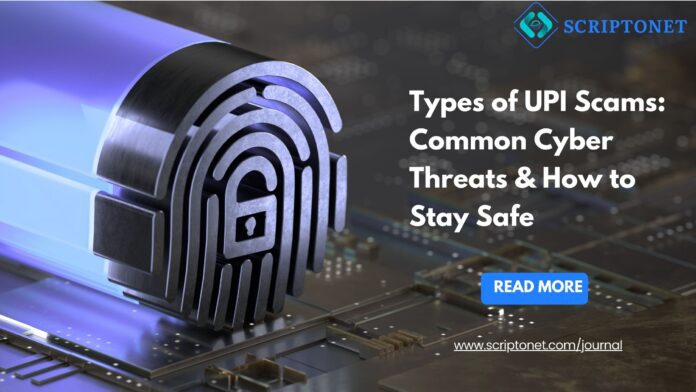Introduction
Digital payments have proliferated in India & the Unified Payments Interface (UPI) has transformed how people send & receive money. UPI facilitates quick & easy digital payments by enabling seamless bank account transfers.However, cyber threats also rise in tandem with digital transactions. Cybercriminals have devised various UPI scams to exploit victims. These frauds compromise user data & result in monetary losses. Understanding these dangers, their mechanisms & how to use UPI safely is essential.

Meaning of UPI
The National Payments Corporation of India (NPCI) created the Unified Payments Interface (UPI), an instantaneous real-time payment system. It allows customers to connect several bank accounts to a single mobile app, facilitating easy transactions. Virtual Payment Addresses (VPA), also known as UPI IDs, streamline UPI transactions in contrast to conventional bank transfers that call for account numbers & IFSC codes. It is one of the most practical digital payment systems accessible since users may conduct transactions around the clock without requiring bank account information.
Types of UPI
UPI has developed several features to accommodate a range of requirements. Among the important kinds are:
- Designed for small-value transactions, UPI Lite enables quicker payments without a PIN.
- Recurring payments for services, invoices & subscriptions are made possible with UPI AutoPay.
- Feature phone users can utilize UPI 123PAY to make UPI payments even if they don’t have internet access.
- UPI Credit on Debit: Increases flexibility by enabling credit card transactions using UPI.
- UPI for International Transactions: Enables transactions in a few foreign nations, extending UPI’s reach to international payments.
Types of UPI Scams
As UPI transactions increase, fraudsters are developing new methods to exploit users. Some common types of UPI scams include:
- Phishing Scams: Phishing is one of the most common cyber threats. Scammers send fake emails, SMS or messages containing malicious links that lead to fraudulent websites. These websites mimic genuine banking portals, tricking users into entering their credentials. Once entered, fraudsters gain access to the user’s UPI account & steal funds.
- QR Code Scams: Fraudsters trick users into scanning a QR code, claiming it will credit money to their account. However, these QR codes initiate a payment from the user’s account instead of receiving money. Many victims fall for this scam while selling items online, thinking they are receiving payment.
- Scams involving phony payment requests: In this scam, scammers fool customers into authorizing a transaction by sending them a message that reads, “Request Money.” The victim unintentionally gives money to the scammer while believing they are authorizing a deposit.
- SIM Cloning & Swap Scams: Cybercriminals use fraudulent methods to gain a victim’s mobile number to replicate their SIM card. They obtain access to the victim’s UPI-connected bank accounts by intercepting OTPs & authenticating transactions after activating the cloned SIM.
- Scams Using Remote Access: Scammers frequently persuade customers to install remote access software like AnyDesk or TeamViewer while posing as customer support representatives. By giving scammers complete control over the victim’s phone, these apps enable them to conduct illegal transactions.
- Lottery & Cashback Scams: Fake emails telling victims they have won lottery prizes or cashback are sent to them. They must make a tiny UPI payment to receive the prize & then the scammers vanish without giving them any cash.
- False Marketplace & E-Commerce Scams: Scammers invite customers to pay using UPI after listing phony goods on internet marketplaces. The con artist either doesn’t send anything at all or sends a fake item once the money is paid.
- Investment & Loan Fraud: Instant loans or high-yield investment possibilities are promised by scammers. As a processing charge, they request users to pay in advance using UPI, but the loan or investment never happens.
- Voice Phishing (Vishing) Scams: Scammers phone users requesting UPI PINs, OTPs or other private information while posing as bank representatives or customer service representatives. Users who are unaware could divulge their information, which could result in financial fraud.
Awareness about UPI scams/frauds
Users need to understand how these scams operate to stay secure. To inform consumers about fraudulent activities, banks & other financial institutions often launch awareness programs. It is essential to:
- Never give out your bank information, OTP or UPI PIN to anybody.
- Don’t download unreliable programs or click on unidentified websites.
- Before approving transactions, confirm any questionable payment requests.
- Use official customer service numbers only from reliable sources.
- Keep an eye out for any unlawful transactions on your bank statements.
Preventive precautions/measures against UPI scams
- Use official UPI apps like Paytm, PhonePe or Google Pay at all times.
- To keep an eye on account activities, turn on real-time transaction alerts.
- Limit daily transactions to reduce possible losses.
- For increased security, use multi-factor authentication.
- Steer clear of using shared or public devices to make UPI payments.
Laws & regulations against UPI scams & frauds
Strict instructions have been released by the Reserve Bank of India (RBI) to safeguard people from online scams. Cyber fraud is covered by the Information Technology (IT) Act of 2000, which also establishes sanctions for violators. Fraud victims can report it to:
- National Cyber Crime Reporting Portal (www.cybercrime.gov.in): To tackle cybercrime, the Ministry of Home Affairs, Government of India, launched the National Cyber Crime Reporting Portal. It offers a consolidated forum for citizens to report offenses relating to cyberspace, such as identity theft, online harassment, UPI scams & financial fraud. Through the portal, victims can anonymously file complaints, access cyber safety materials & have their reports forwarded to the appropriate law enforcement agency for prompt action. To stop financial losses, the 1930 helpline also encourages prompt reporting of financial cyber scams.
- The bank’s customer care or fraud helpline: To help consumers report suspicious transactions or UPI frauds, each bank provides a dedicated customer service or fraud helpline. Consumers can freeze transactions, block their accounts & get advice on how to stop more losses right away. The likelihood of recovering missing money is increased by prompt reporting.
- The RBI Ombudsman for Digital Payments: The Reserve Bank of India (RBI) established the RBI Ombudsman for Digital Payments as a grievance redressal mechanism. It handles grievances about online transactions, such as unsuccessful transactions, unauthorized debits & UPI fraud. To ensure equitable & open dispute resolution, users can turn to the Ombudsman if their problems are not addressed by the bank or payment service provider.
Case Studies on UPI Scams
Case Study 1: The QR Code scam
After scanning a QR code supplied by a scammer posing as a buyer, a businessman/techie from Bengaluru lost ₹2,00,000 in the OLX QR code scam. The victim, a 27-year-old software engineer, posted an ad on the internet marketplace OLX to sell his air cooler; he received a response in three minutes & lost about Rs 2 lakh. (Source: Times of India).
Case Study 2: Fake customer support
After contacting a phony customer service number, she discovered on Google that a woman in Mumbai had lost ₹1 lakh. She was duped by the scammer into divulging OTPs, which permitted her UPI account to be used for illegal activities. (Source: Times Of India).
Judgment of Case Studies on UPI Scams
Courts & regulatory bodies have stressed the significance of user awareness & attentiveness in numerous UPI scam instances. Usually, judgments take into account:
- Bank Liability: The bank may be required to reimburse the victim if the fraud was caused by a technological error or security breach.
- User Negligence: Reimbursement may be refused if the user voluntarily divulges private information (such as an OTP or UPI PIN) or falls for social engineering scams.
- Timely Reporting: Victims who notify the bank & cybercrime authorities of fraud right away have a better chance of getting their money back from the court.
- Penalties for Fraudsters Under the law, scammers who are discovered are subject to prosecution under the Indian Penal Code (IPC) & the Information Technology (IT) Act, 2000, which carry fines & jail time as punishments.
Promoting digital literacy, encouraging safe transaction practices & ensuring impartial investigation of digital payment frauds are the main themes throughout the rulings.
Future of UPI & Scam Prevention
Machine Learning (ML) & Artificial Intelligence (AI) are being incorporated into financial systems to identify questionable transactions to fight fraud. To increase security, biometric authentication & fraud detection algorithms are being used. Additionally, by decentralizing & protecting payment data, blockchain technology might present fresh approaches to stopping online fraud.
Conclusion
In India, UPI has completely changed digital payments, but it has also drawn fraudsters who want to take advantage of gullible people. Users can protect themselves against financial theft by being aware of the many kinds of UPI frauds & taking preventative action. UPI security will continue to be strengthened by government initiatives, stringent legislation & technological breakthroughs, guaranteeing everyone can transact securely online.
Frequently Asked Questions (FAQ)
What is a UPI scam?
One kind of cybercrime is a UPI scam, in which con artists deceive victims into making illegal transactions in order to steal money from their UPI-connected bank accounts. Phishing, phony money requests, QR code scams, and SIM cloning are examples of common techniques.
Without my PIN, is it possible for someone to steal my UPI account?
No, a hacker cannot directly access your UPI account without your UPI PIN. However, if you inadvertently give your PIN, OTP, or remote access to a fraudster, they can use your phone.
If I fall for a UPI scam, can I get my money back?
If the fault is not demonstrated, banks may reverse the transaction if you notify the fraud within 24 hours. The likelihood of recovery is reduced, though, if you voluntarily disclose your PIN or OTP.
What is SIM swapping & how does it affect UPI security?
SIM switching is the technique of con artists impersonating you in order to get a duplicate SIM card bearing your cellphone number at a telecom store. Once they have your bank account information, they can reset your UPI credentials and intercept OTPs.
If I suspect fraud, can I disable my UPI ID?
You can use the UPI app’s settings or get in touch with your bank to deregister or disable your UPI ID. This will stop your UPI-linked account from making any more transactions.
Do UPI fraudsters face any legal repercussions?
UPI fraud is a crime that carries fines and jail sentence, as stated in Section 66D of the IT Act of 2000. The RBI and cyber police are the places where victims can report fraud for inquiry.


